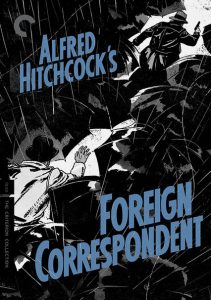Foreign Correspondent-1940
Director Alfred Hitchcock
Starring Joel McCrea, Laraine Day
Scott’s Review #1,158
Reviewed July 2, 2021
Grade: B+
As a superfan of all films Alfred Hitchcock, I had been chomping to see some of his older selections before he took American audiences by storm throughout his 1950s and 1960s heyday.
Many people do not realize just how many films the “Master of Suspense” made that are not household names.
Foreign Correspondent, made in 1940, is a black-and-white production and a prominent precursor for his later works. Much of the fun is zeroing in on particulars that would be featured in later films.
Hitchcock favorites, such as a tower, a circling airplane, an unwitting and innocent man involved in a political plot, and a false identity, are served up. The director’s obsession with female characters wearing glasses is undoubtedly part of the fun.
What Hitchcock fan doesn’t giggle with glee after discovering the director’s trademark cameo appearance in each of his films?
As an aside, I love the cover artwork for this film.
Foreign Correspondent isn’t one of the best-remembered Hitchcock films because it’s only perfect rather than exceptional.
In 1940, the director was getting his groove following a surprising Best Picture Oscar win for Rebecca (1940), a film that was a very early American effort. He was still finding his footing in production values.
The legendary Costume Designer Edith Head and Music Composer Bernard Hermann had not joined the fold yet as they would in masterpieces like The Man Who Knew Too Much (1956) and Vertigo (1958), and it shows. The musical score is ordinary, more or less what a picture made in 1940 sounded like.
The costumes are decent but lack the grandeur and style that Head brought to the productions.
New York City-based crime reporter John Jones, later renamed Huntley Haverstock, played by Joel McCrea, is reduced to producing dull copy despite the world being on the cusp of war. His editor hopes a change of scenery will be what Jones needs to get back on track and provide a juicy story.
He is re-assigned to Europe as a foreign correspondent. When he stumbles on a spy ring, he attempts to unravel the truth with the help of a politician, Stephen Fisher (Herbert Marshall), his daughter Carol (Laraine Day), and an English journalist (George Sanders). But can any or all of them be trusted, or are they in cahoots with the bad guys for their gain?
The plot alone immediately reminded me of Saboteur (1942). Both involve a complicated (maybe overly?) story of government, investigations, and sabotage.
They also each focus on a couple attempting to outwit or outrun authorities. They are both filmed with black and white cinematography.
Foreign Correspondent contains its share of thrills and compelling moments. The best sequence is when John is nearly shoved off the tower of Westminster Cathedral by a hitman, who ultimately plummets to his death. The obvious parallel is to Vertigo, especially when the nuns give the sign of the cross after the body falls.
Other mentions include a terrific airplane finale with astounding, long-lasting special effects. Also unforgettable is a windmill sequence that will remind any Hitchcock fan of the famous cropduster scene from North By Northwest. I half expected a character to exclaim, “The windmill is turning where there isn’t any wind.”
At two hours, even in run time, Foreign Correspondent is a good fifteen minutes too long. The plot takes some time to pick up speed, and John and Carol’s chemistry is relatively weak. They are certainly no Mitch and Melanie like from The Birds (1963).
Foreign Correspondent (1940) is a second-tier Alfred Hitchcock film with enough components to serve as a solid opening act for North By Northwest. This is not such a bad thing, and the film holds its own against similarly patterned films of its day.
Oscar Nominations: Best Motion Picture, Best Supporting Actor-Alan Basserman, Best Original Screenplay, Best Cinematography, Best Art Direction, Best Visual Effects
